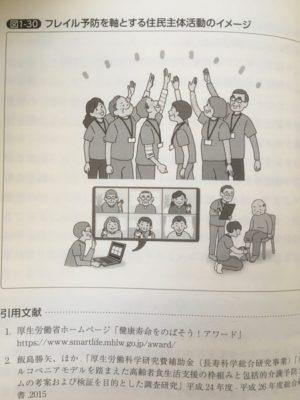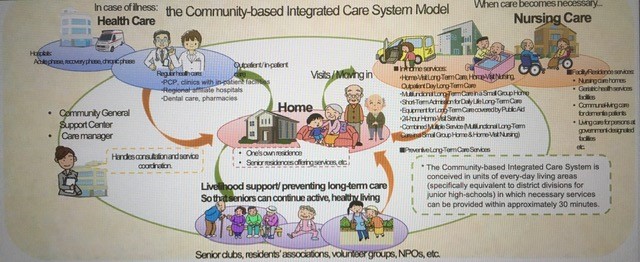
16 October 2023
With contributions from 21 authors, the book "Prevention of frailty among older persons in Japan: A community-wide approach" reflects the decades of first-hand experience of Prof. Tsujii, a former senior official at the Ministry of Health, Labour and Welfare.
National long-term care insurance (LTCI), available to all those aged 65 and over, as well as the disabled in Japan, designates “frailty prevention” as a top national priority. Integrated Community Care Support Centers (Chiiki Hokatsu Shien Center or “Support Center”) are encouraged to build a comprehensive community-wide structure that provides opportunities for employment, volunteer work, and social involvement for older persons which is a key to the success of the prevention effort.
The book incorporates contributions from 21 authors, including a former Ministry of Health, Labour and Welfare (MHLW) official, university professors, and administrators of existing Support Centers. Written for policymakers, field professionals, and community residents, the book includes a detailed summary discussion of frailty prevention in Japan, as well as nine case studies from communities in urban and rural areas. Dr. Iijima and Prof.Tsuji are Director/Professor and Professor, respectively, of the Institute of Gerontology, University of Tokyo. Prof. Tsuji is also the President of ILC Japan.
This book reflects the decades of first-hand experience of Prof. Tsujii, a former senior official at the MHWL that has created, developed, and implemented Japan’s LTCI. The book provides important perspectives/lessons for all of those who are concerned with sustainable long-term care policies/programs around the world.
Since its establishment in 2000, the LTCI has operated under the auspices of the MHLW and is funded through a combination of premiums paid by citizens, government subsidies, and modest “co-payments” by service recipients. The system provides in-home services, adult day-care centers, short-stay facilities, rehabilitation services, and institutional care.
Expenditures under the LTCI have been on the rise since its inception, from 3.2 trillion Yen in 2002 to 6.0 trillion Yen in 2019. This represents a corresponding increase from 0.7% to a little over 2% as a percentage of Japan’s GDP. This trend is often attributed to the growing population of older persons and the common tendency that once an old person starts receiving care services, he/she tends to continue to require services, often increasing in amount and intensity. “Prevention of frailty” is designed to improve the quality of life for older people while still containing costs.
Japan’s approximately 5,400 Support Centers play a central role in the delivery of services. Each Support Center services an area approximately the size of a middle school district and is tasked with providing services for the older residents in their catchment area. When an insured older person (or his/her family) recognizes a care need, an application is filed to the municipal government for certification of need. With the help of an assigned care coordinator, the Center not only evaluates the extent of disability and services needed but also coordinates service delivery.

Using findings from decades of experience accumulated by the authors and nine case studies, Prof. Tsuji et al. offer the following observations:
- Effective combating of frailty under the LTCI cannot be attained by individuals or their families alone; instead, it requires a community-based approach. Frailty must be conceptualized multidimensionally with a focus on:
- nutrition (including oral health)
- physical activities
- social participation
- Effective prevention requires a good measurement of frailty. In fact, the Scale for Frailty presented in 2001 by Dr. Linda Fried of Columbia University, et al., is universally utilized in Japan for assessment.
- Frailty is reversible when focused short-term care plan of care is provided. According to a MHWL study of 11 communities, when a group of older people certified as “needing support” (Shien Class 1) or “needing care” (Kaigo Class 1) was provided with focused short-term care services, 63% renewed their service application after one year compared with 92.7% of comparable patients in the control group (not receiving focused short-term care services). Motivating older persons to be “independent” and self-reliant requires a careful designing of services. For instance, providing too much help with housework may make care recipients prematurely dependent on the service.
- Unless the Support Center utilizes proactive and innovative outreach efforts, it can be difficult to involve older residents in the “frailty prevention campaign.” Effective measures are needed in the areas of
- education/information dissemination
- periodic health/physical strength examination
- a variety of opportunities for social interaction that are appealing to older persons. Examples include
- hosting a “frailty check” campaign at a popular shopping mall
- following up of registrants with the help of “frailty prevention supporters” who are themselves elderly
- A well-known community redevelopment program in Kashiwa City (see “Community-based Integrated Care system for Urban Renovation: Toward Comprehensive Community Design for Aged Society” in the bibliography) suggests that successfully combating frailty requires a comprehensive community-wide effort involving the government, local industry, academic institutions, and residents because the issue is multifaceted.
- The authors welcome the development of modern information and technology know-how such as AI and data processing capability, and recognize its potential to contribute to efficient operation of existing Support Centers.
The rapid ageing of society combined with a declining population provides a serious challenge for the LTCI. The authors assert that effective prevention of frailty among older persons is essential for the sustainability of the LTCI. Because frailty prevention is multifaceted, it requires creating a comprehensive community support structure that encompasses not only caregiving but also opportunities for employment, volunteering, and social interaction for older persons.
References:
Institute of Gerontology, the University of Tokyo, “Community-based integrated care system for Urban Renovation: Toward Comprehensive Community Design for Aged Society.” University of Tokyo Press, 2020 (In Japanese)
Linda P. Fried, et. al., “Frailty of Older Adults: Evidence for a Phenotype,”
The Journals of Gerontology: Series A, Volume 56, Issue 3, 1 March 2001
Ministry of Health, Labour and Welfare (Japan), “Regarding the Further Strengthening and Promotion of Comprehensive Community Care System [Chiiki Hokatsu Kea Shisutemu)]” in Japanese, published in May 2023. https://www.mhlw.go.jp/content/12300000/001005603.pdf
OECD, “Spending on Long-term Care,” November 2020. https://www.oecd.org/health/health-systems/Spending-on-long-term-care-Brief-November-2020.pdf
Tetsuo Tsuji, Katsuya IIjima, et.al. “Chiikide Torikumu Koreisha no Fureiru Yobo” (“Prevention of frailty among older persons in Japan: A community-wide approach”), Chuohoki Publishing, 2021. (In Japanese)-reported in this article.
Photo credit (color): MHLW, “Establishing Community-wide Integrated Care System, 2017.
Photo credit (black and white): Tsuda, Iijima, etc. ”Prevention of frailty among older Persons in Japan: A Community-wide Approach,” 2021 (See the References above)
Authors: Masako Osako, PhD, Phaenarete Hartley, MD
The International Longevity Centre Global Alliance is delighted to be approved as an Affiliate of the World Health Organization Global Network of Age Friendly Cities and Communities.
20th June 2025
The ILC Europe Network, launched in December 2021, addresses longevity and population ageing in Europe. The Network works to organise policy and research events, share good practice, and engage with policymakers across the continent.
20th June 2025
Young and old united in imagination
Generation Mixer is a creative project connecting primary school children and local older adults through the power of imagination. By inventing and exploring imaginary worlds together, generations build meaningful bonds and discover new talents.
19th June 2025


